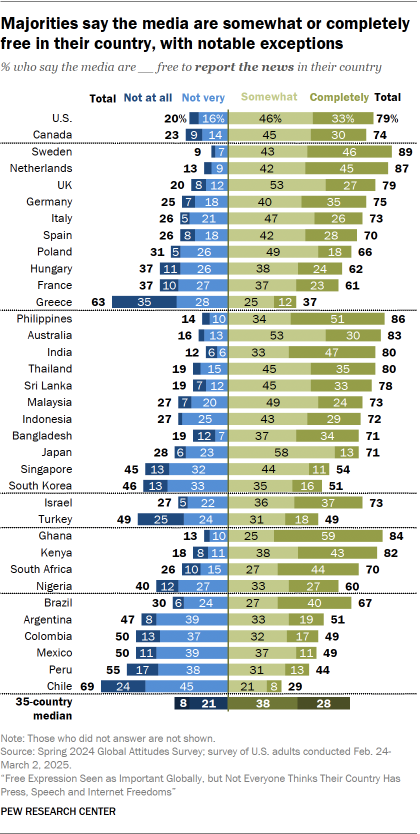☀️ Happy Thursday! The Briefing is your guide to the world of news and information. Sign up here!
In today’s email:
- Featured story: Turkish court gives Swedish journalist suspended sentence for “insulting Erdoğan”
- New from Pew Research Center: Americans largely foresee AI having negative effects on news and journalists
- In other news: White House launches website to promote pro-Trump news stories
- Looking ahead: CPB sues Trump over firings
- Chart of the week: Views about the state of press freedom in 35 countries
🔥 Featured story
Swedish journalist Joakim Medin received an 11-month suspended sentence in Turkey for insulting President Recep Tayyip Erdoğan. Medin, affiliated with the Swedish newspaper Dagens ETC, was arrested at Istanbul airport on March 27 after arriving to cover mass protests in Turkey. Though the court ordered the journalist’s release after sentencing, he remains in prison awaiting trial for a second charge: belonging to a terror organization.
People in Turkey are split over whether the media are free to report the news in their country, according to a recent Pew Research Center study on global views of press, speech and internet freedom. About half of Turks (49%) say media in the country are not free to report the news in their country, including a quarter who say the media are not at all free. Another 49% say the media are completely or somewhat free.
Those who support Erdoğan’s government are much more likely than those who don’t to say the media in Turkey are completely free to report the news (40% vs. 7%).
🚨 New from Pew Research Center
Roughly half of U.S. adults say that AI will have a very (24%) or somewhat (26%) negative impact on the news people get in the U.S. over the next 20 years, while just 10% say the effect will be positive, according to a Center survey conducted last year. Meanwhile, a majority (59%) say AI will lead to fewer jobs for journalists in the next two decades, compared with only 5% who say AI will produce more journalism jobs.
The full analysis also looks at concerns about inaccurate information from AI, and views about how AI does at writing a news story today compared with human professionals.
📌 In other news
- White House launches White House Wire, a website to promote pro-Trump news stories
- A look at the new media, Trump-aligned outlets in the White House briefing room
- Paramount looks toward possible settlement in Trump’s “60 Minutes” lawsuit
- Judge orders Trump administration to restore $12 million in funding to Radio Free Europe
- Spotify has paid more than $100 million to podcasters since January in an attempt to draw creators and audiences back from video podcasting
- LA Times said to have lost $50 million in 2024 amid declining subscribers, advertisers
- Substack’s aspirations with co-founder Hamish McKenzie
- Romanians continue to turn to TikTok for guidance in rerun of presidential election; original results were annulled over Russian interference on the app
📅 Looking ahead
The Corporation for Public Broadcasting (CPB) sued the Trump administration this week for removing three of its board members. The lawsuit alleges that although the board members are nominated by the president and confirmed by the Senate, the CPB is a private corporation and therefore not under the authority of the president. These moves are happening amid a push from the White House and members of Congress to scale back federal government funding for the CPB, which supports NPR and PBS (including local member stations).
A recent Center survey found that 20% of U.S. adults say they regularly get news from NPR, and 21% say the same about PBS. Additionally, Americans are more supportive of the federal government continuing to fund NPR and PBS (43% favor this) than they are of the federal government removing funding (24%), although a third are unsure.
Republicans are much more likely than Democrats to support ending federal funding for public media, and also less likely to get news from NPR and PBS or to trust these outlets as sources of news.
📊 Chart of the week
Our chart this week comes from our recent report on freedom of speech, internet and the press around the world. A median of 28% across 35 countries say the media are completely free to report the news in their country. Another 38% think the media are somewhat free.
Negative perceptions of press freedom are common in most of the Latin American countries surveyed, especially Chile. Roughly seven-in-ten Chileans (69%) say the media are not very or not at all free to report the news. And opinions are divided in Argentina, Colombia, Mexico and Peru.

👋 That’s all for this week.
The Briefing is compiled by Pew Research Center staff, including Naomi Forman-Katz, Jacob Liedke, Christopher St. Aubin, Luxuan Wang and Emily Tomasik. It is edited by Michael Lipka and copy edited by David Kent.
Do you like this newsletter? Email us at journalism@pewresearch.org or fill out this two-question survey to tell us what you think.